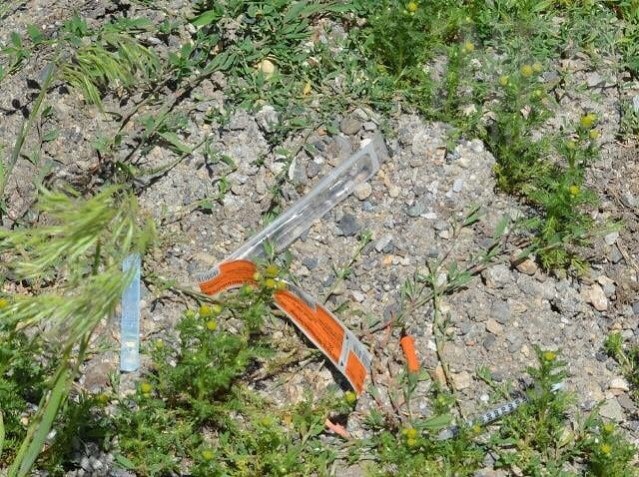
(CHARLOTTE HELSTON / iNFOnews.ca)
July 13, 2018 - 2:20 PM
KAMLOOPS - At least two communities in the Southern Interior have created a grassroots needle buyback program to help clean up sharps from public places, and although Interior Health isn't entirely opposed to the idea, the health authority does have concerns.
Interior Health medical health officer Dr. Silvina Mema says she appreciates the fact volunteers have a vested interest in their community, but feels there are different ways to go about it.
"We welcome innovative ideas and volunteers, community grassroots ideas," Mema says. "We welcome the help. In general, it's great to have people in the community think about this issue while taking steps toward improving the environment."
She emphasizes the volunteer groups should come to the Interior Health Authority with their ideas before taking matters into their own hands. A pair of volunteers in Kamloops started a temporary needle buyback program last month, giving five cents for each sharp turned in. A similar approach is being taken by a pharmacy in Penticton.
Interior Health says in a news release that 99 per cent of the needles distributed into communities in 2017 were properly disposed of by Interior Health, although efforts by iNFOnews.ca to retrieve the data for those numbers have not been successful.
In the release, the health authority states it's working with municipalities to install new large industrial sharps bins in hot-spot areas to increase easy access to safe disposal options.
"Collaboration with municipalities, community agencies, and concerned citizens is essential to minimize any impact of improperly discarded needles in the community," the release states. "Interior Health appreciates innovation and encourages communities to develop programs tailored to address their needs. Regarding the recently developed needle buyback programs, it is the experience of other communities across our province that such a program wasn’t feasible."
Mema echoed that sentiment in her interview with iNFOnews.ca. She pointed to concerns around volunteers handling individual needles, placing a monetary value on needles leading to people stealing or breaking into sharps containers, and concerns around people requesting clean needles and then returning them unused to generate a profit.
Mema encourages anyone who wants to introduce similar programs in their community to contact either Interior Health, or their local government directly to come up with a community-based solution.
"If they come to us and present those ideas, we will tell them our concerns," Mema says. "Now I have to tell them what my concerns are through the media. I would prefer we have this conversation where it belongs which is at the community level."
She adds that needle buyback programs have not been studied enough to prove their effectiveness, whereas other programs like having people on the streets clean up parks and public places for a flat rate per day have been proven to work. These "peer programs" are of value because those who are picking up the needles know the hot spots for them to be discarded, she says.
"If there is money to do something… there are other things that are evidence-based, there are other programs that have shown to be effective," she says. "Whatever is implemented needs to pass the common sense bar and pass the concern test.”
Although Mema has her concerns, she doesn't think these grassroots programs should be shut down immediately. She believes this could start a conversation about how things work and the best way to achieve clean communities.
"I am cautiously observing this and hoping we can engage these people in conversations," she says. "We want the same thing, we want needles off the streets. So lets work together."
She adds the main focus on everyone's minds shouldn't necessarily be discarded needles, it should be getting to the root of the addiction problem our province is facing right now and finding solutions.
If you want to discuss your ideas about needle clean up, you can contact your local community action team, harm reduction agencies or local government. You can contact Interior Health directly here.
To contact a reporter for this story, email Ashley Legassic or call 250-319-7494 or email the editor. You can also submit photos, videos or news tips to the newsroom and be entered to win a monthly prize draw.
We welcome your comments and opinions on our stories but play nice. We won't censor or delete comments unless they contain off-topic statements or links, unnecessary vulgarity, false facts, spam or obviously fake profiles. If you have any concerns about what you see in comments, email the editor in the link above.
News from © iNFOnews, 2018